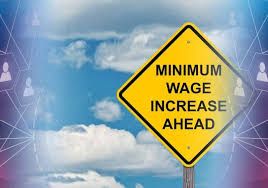Minimum Wage Increases – Changes for Employers to Note from 1 April 2025
From 1 April 2025, the minimum wage in New Zealand will increase, impacting employers across all industries. It is crucial for businesses to be aware of these changes and ensure compliance to avoid potential penalties. Below are the key details and considerations for employers.
New Minimum Wage Rates
Effective from 1 April 2025, the updated minimum wage rates will be:
- Adult Minimum Wage: $23.50 per hour (up from $23.15 per hour)
- Starting-Out and Training Wage: $18.80 per hour (up from $18.52 per hour)
Employers must ensure that all employees receive at least the new minimum rates from this date.
PAYE and ACC Levy Changes
Although there are no changes to PAYE rates since the thresholds changed on 31 July 2024, employers should note the following:
- ACC Earner Levy Component of PAYE: Increasing from $1.60 per $100 of income to $1.67 per $100. This will result in a slight decrease in employees' net pay.
- If you manually process payroll, check the updated PAYE amounts via IRD’s PAYE tables or online calculator.
- Student Loan Threshold: No changes have been announced.
ESCT Rate Updates
1 April is the time of year when employers should review their employees' ESCT (Employer Superannuation Contribution Tax) rates, as adjustments can only be made at the start of a new tax year. The new ESCT thresholds, effective from 1 April 2025, are:
| ESCT Threshold | Tax Rate |
| $0 - $18,720 | 10.5% |
| $18,721 - $64,200 | 17.5% |
| $64,201 - $93,720 | 30% |
| $93,721 - $216,000 | 33% |
| $216,001 upwards | 39% |
If you use a manual payroll system, ensure that employees are on the correct ESCT rate. Most payroll software systems will update ESCT rates automatically, but it is advisable to verify that these changes are correctly applied.
Key Considerations for Employers
- Payroll Adjustments: Ensure payroll systems reflect the new wage rates and tax adjustments to avoid underpayment issues.
- Employment Agreements: Review and update employment agreements where necessary to align with the new wage rates.
- Budgeting and Cost Planning: Assess how these increases may impact operational costs and plan accordingly.
- Overtime and Allowances: Consider the effect of higher wages on overtime payments, allowances, and other employee benefits.
- Compliance and Record-Keeping: Maintain accurate wage records and ensure compliance with employment law requirements to avoid potential fines or legal action.
Next Steps for Employers
- Communicate Changes: Inform employees of the upcoming wage increase and how it may impact their earnings.
- Seek Advice if Needed: If unsure about compliance or wage structures, consult with an employment relations specialist or accountant.
- Review Business Operations: Consider strategies such as efficiency improvements, pricing adjustments, or workforce planning to manage the increased labor costs.
Get in Touch
For further details or support on how these changes may impact business, please contact our team.





